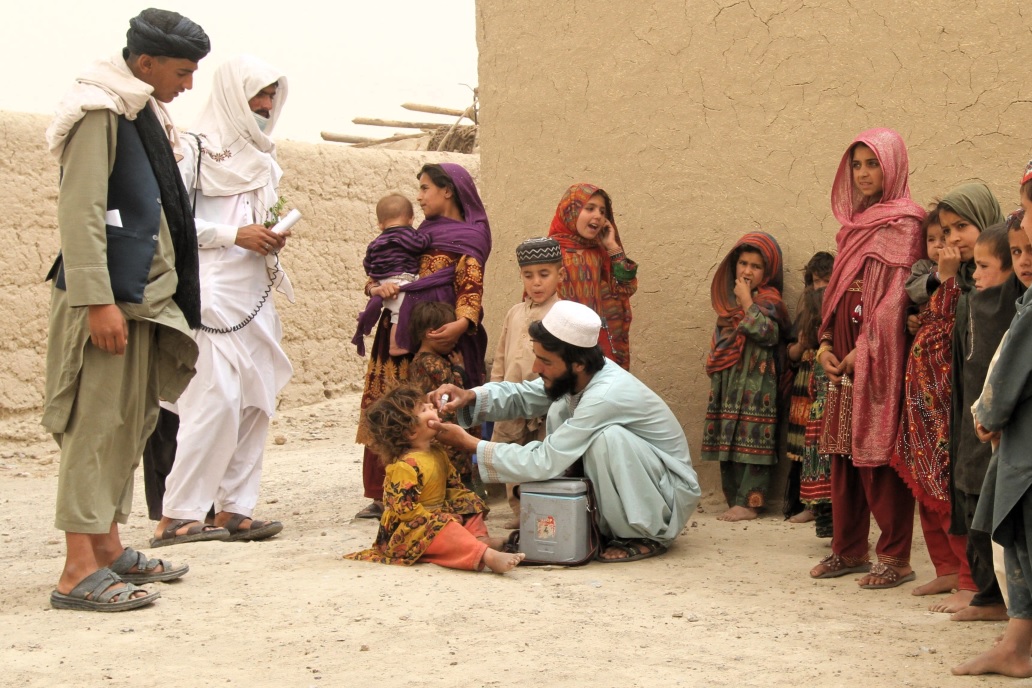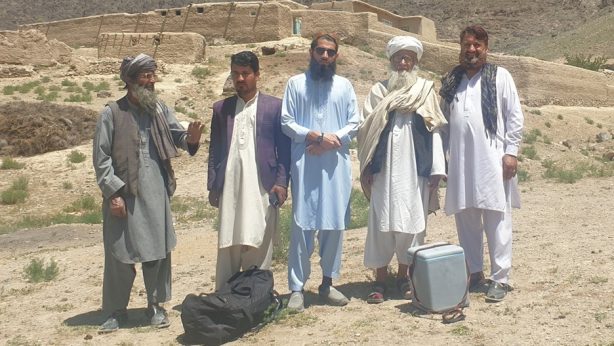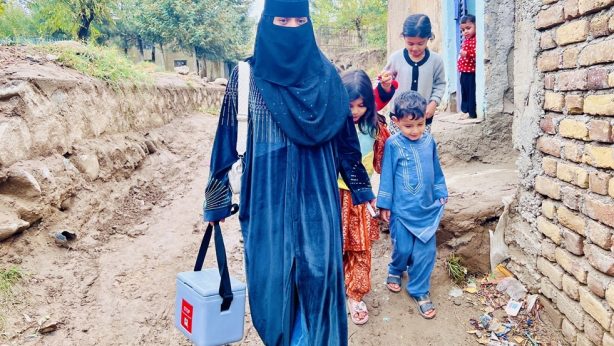From Danger to Safety; Significant progress has been made in the fight against polio virus in Kandahar

Bashir Naadim
(Kandahar, Afghanistan): Kandahar, formerly one of the most high-risk regions for polio in children and at the forefront of polio cases, has now witnessed significant progress in the battle against the virus.
Around three years ago, over half of the polio cases in the country were reported in the southern region, with the highest number of cases recorded in Kandahar at the provincial level. However, in recent years, no human case of polio has been reported in this region.
In the past years, polio environmental cases were high, but now it has significantly decreased, with only one environmental case in the past one year.
A polio volunteer administers vaccines to children in the Daman district of Kandahar © Polio Free Afghanistan/2023/Naadim
The Past and Present Situation of Polio in Kandahar
Aminullah Amin, a Public Awareness Officer of the Polio Prevention Program in Kandahar, said that in the year 2020, a total of 56 polio cases were recorded in the country, out of these cases, 38 were reported in the southern zone, with Kandahar alone accounting for 14 of them.
He stated, “It was concerning that in the year 2020, more than half of the polio cases in the country were reported in the southern zone, with Kandahar having the highest number of cases among the provinces. We encountered challenges such as conflicts, limited vaccine campaign coverage, refusals from many families to vaccinate their children, and various other factors.”
He reports that over the past two years, despite the polio disease not having been eradicated from the country, there has been a decrease in the number of cases due to strengthened security measures, and the disease has been successfully been reduced in the southern zone.
Mr. Amin, “Four cases of polio were recorded in 2021, two in 2022, and five cases in 2023 so far. However, during this period, no cases have been registered in Kandahar, Helmand, Urozgan, and Zabul provinces in the southern zone. But a recent environmental case of polio virus was recorded in Kandahar.”
He notes that, considering the figures mentioned above, the environmental cases of polio have also decreased in this region. Previously, samples were collected from the environment in Kandahar every 15 days which showed signs of wild polio virus.
What efforts have been effective in meaningfully decreasing the polio virus?
Since the last two years, as a result of successful community engagement, the increase of public awareness, and the expansion of the coverage area of vaccination campaigns, there has been a lot of progress in the fight against polio in this province and the southern region.
Amin says that community engagement has proven to be the most effective of many efforts in the fight against polio. Previously, this intervention was hindered by conflicts and insecurity.
He expresses that until the end of 2021, the Immunization and Communication Network (ICN) was active here and maintained close relations with community leaders, religious leaders, Imams of mosques, teachers, women and youth groups and local officials. Due to their efforts, vaccination coverage in Kandahar was expanded.
He mentioned, “In the past, due to insecurity and various challenges, the vaccination coverage in Kandahar districts was only 30% to 40%, resulting in many children remaining unvaccinated. However, with the improvement in the security situation, the vaccine coverage has now increased to a range of 90% to 95%.”
He denoted that vaccination teams operating along the Durand Line with Pakistan in the Spin Boldak district effectively reduced polio cases, playing a crucial role in preventing poliovirus transmission on both sides.
He adds that thousands of families travel along the mentioned route every day, and children up to the age of 10 are regularly vaccinated by the appointed teams to prevent the spread of the polio virus.
Apart from this, he also indicated that hygiene or health protection, which had a vital role in reducing polio cases, which has attracted the attention of people after the spread of the coronavirus epidemic.
Fear and anxiety
Aminullah Amin stated that they are working to enhance efforts against polio to protect not only the children in the southern region but also the entire country from this perilous disease.
He referred to the most recent five polio cases in Nangarhar province as tragic and emphasized that without the effective implementation of a comprehensive polio vaccination policy at the national level and an expansion of vaccination coverage, children in provinces like Kandahar and others may also be at risk of contracting this disease.
He emphasizes that the goal of preventing polio should involve employing various strategies tailored to specific situations and locations to ensure that all children under five years of age are vaccinated, whether it be at home, in kindergartens, health centers, entertainment venues, mosques, or other places.
People also find the implementation of various policies and approached to be effective and valuable in preventing the polio virus
The residents of Kandahar also emphasize that in order to effectively prevent the transmission and spread of the polio virus, it is essential to employ a range of effective strategies during vaccination campaigns to ensure that every child is vaccinated and none are left unvaccinated.
Akhtar Muhammad, a 45-year-old resident of Spin Boldak district in Kandahar, took his eight-month-old son out for polio vaccination © Polio Free Afghanistan/2023/Naadim
Akhtar Muhammad, a 45-year-old resident of Spin Boldak district in Kandahar, took his eight-month-old son out for polio vaccination. He expresses his happiness that the spread of polio has been decreased in this province and emphasizes the need for this situation to persist.
He said, “Our children are still facing the threat of polio virus. To prevent it, the vaccination campaign should be implemented effectively.”
He also emphasized the importance of having female vaccinators present. Their involvement ensures that the polio vaccine reaches every home and every child. Furthermore, they can engage in face-to-face conversations with mothers who may be hesitant to vaccinate their children, effectively persuading them to do so.
He highlighted the crucial role of officials in fulfilling their responsibility for the health and better future of children, urging them to take these necessary steps and other essential measures.
The local officials and members of the polio program are making these statements in light of the recent nationwide polio campaign, during which 11 million children under the age of five were vaccinated just few weeks ago.
Currently, Afghanistan and Pakistan are the only two countries in the world where the polio virus still exists, posing a threat to the lives of children.




